‘Explore, and be Challenged’
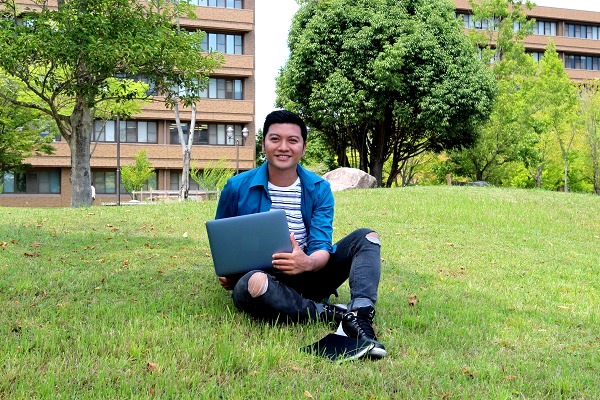
Name: Dave Angeles
Home Country/Region: Philippines
Affiliation: Teacher Training Program at Graduate School of Education
Hobbies: Watching documentary videos, listening to old music, traveling in Japan
(Date of Interview: July 21, 2017)
What is your hometown like?
My hometown is called Bayambang, and it’s in the south of Pangasinan Province in the island of Luzon, Philippines. Pangasinan is famous for the tourist spot known as the ‘Hundred Islands’ (National Park), where you can do island hopping. Each island offers a lot of things and we named them ‘Monkey Island’, ‘Governor’s Island’ etc., depending on the features of that island. You can also go swimming and snorkeling in the crystal clear sea.
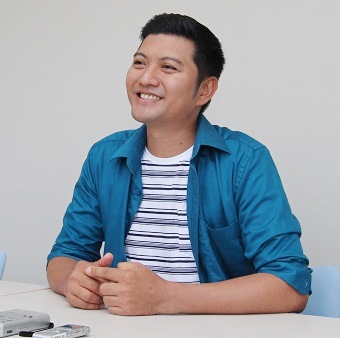
My province is also known to be a top producer of agricultural products in the Philippines, like rice, corn, mangoes, watermelons, and onions. And my hometown Bayambang is famous as the Guinness World Records title holder for the longest barbecue (measured 8 km), and of course I was part of the team! In that particular event, we grilled fresh water fish from the famous Agno River and fish ponds in my hometown.
That’s amazing. Actually, I watched a video of the Hundred Islands of Pangasinan recently, and I thought it was a little similar to the view of the Seto Inland Sea of Japan.
Oh, yes, yes! When I took a ferry over the Seto Inland Sea, from Hiroshima to Ehime Prefecture, I remembered my hometown too. Japan and Philippines are both ‘archipelagos’ consisting of many islands.
Indeed. By the way, how did you become interested in Japan?
When I was a child, I used to watch Japanese animes and superhero fictions like ‘Doraemon’, ‘Bioman', ‘Shaider’, ‘Voltes V’, etc. Japan is also known for its high technology inventions which I am interested in, and I’d read that Japanese people are so polite. So those are the things that made me choose Japan.
In your country, do the people know a lot about Japan like you?
Yes, they know a lot about Japan, especially the food. Sushi is popular. And in the capital city Manila, we have Japanese ramen shops. Also Japan helps the Philippines during disasters such as typhoons and earthquakes; I think that made Japan very famous in the Philippines.
I see. Dave-san, why did you choose Hiroshima University?
When I passed the MEXT scholarship for the Teacher Training Students, the embassy gave us the opportunity to choose the university in Japan. So I asked my friend, who was a teacher-trainee in Japan, ‘can you suggest a university for me to enroll in? Like your university?’ And she said, ‘choose Hiroshima University!’ I said, ‘why are you not recommending your university?!’ She did not mention the reason (laughs), but she said that Hiroshima University is known to be the best in education. And she was right!
So your friend's advice brought you here. What was your first impression of Hiroshima University?
My first impression was that this university is very organized in managing the students, giving schedules, etc. As for the physical arrangement, it’s very balanced between the buildings and the trees. When I first arrived, it was autumn. I loved the trees on campus because the colors were turning yellow, red, maroon, it was very colorful.
The physical facilities are also perfect - they’re very conducive for learning, providing everything for the students, as well as guidance from my tutor. When I first arrived in Japan, I was really at a loss. I didn’t know the language or anything. I didn’t read or search about Hiroshima University on the website because I wanted to see it personally. But, I was soon at ease because a student supporter helped us in everything, such as telling us where the department store is and other facilities. They really helped a lot during our first days in Hiroshima University. As for the enrolment process, it was very convenient and we had Japanese staff who helped us fill out those papers.
Could you tell us a little about your current research?
Well, I am under the teacher training program, and am conducting research on Japanese education and curriculum especially in (senior) high school. I observe classes in high school and study the approaches and strategies of teaching so I can adopt them in my home country.
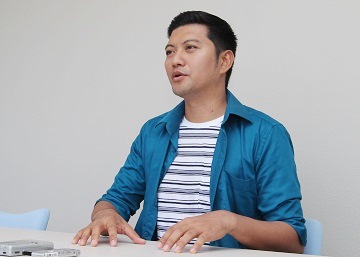
I’ve heard that your country had a change in its education system recently.
Yes, exactly. The new education curriculum in the Philippines is known as the Enhanced Basic Education Curriculum, or the ‘K to 12 program’, wherein the compulsory education for the Filipino students is from Kindergarten to grade 12. Before, it was only from grade 1 to grade 10, so they added kindergarten (1 year) and 2 years for senior high school. I came to Japan to adopt the things they are excelling in. For example, the Lesson Study, or the jyugyou kenkyuu - Japan is known for that and it is being imitated and adopted in different countries around the world, including the Philippines.
We are in the starting period of implementing the Lesson Study and it is being initiated by some institutions in the Philippines by conducting seminars and workshops about it. So that struck my attention! Japan has perfected the process of Lesson Study already, so I wanted to see how the Japanese teachers and students coordinate with each other to have the perfect educational system. I also observed that teachers in Japan are really active in improving their classroom education.
Back in the Philippines, you are a high school science teacher, right?
Until recently, I was teaching at what is called ‘junior high school’ in Japan. But since we opened the senior high school, I was transferred to that new program. So I am now a senior high school teacher.
So, you are the ‘first-generation’!
For ‘senior’ high school teachers under the new system, yes. That’s why I wanted to get some ideas, and study and bring them to my home country and adopt the positive things for the benefit of our education system.
You’ve observed some actual classes at Japanese high schools. How did you feel about them?
My first impression is that everything is well-prepared. In the Philippines we are prepared too. But in Japan, the classroom is complete with all the things they needed, the visual aids, equipment, and all the apparatuses they need for experiments. The students also participate actively in their class, and they are quiet as well! (laughs) They do whatever their teacher instructs them to do. They do the experiment well, they are very competitive, but during the lecture they are so quiet. And when the teacher asks questions, they raise their hands to participate actively.
Also, I really enjoyed seeing the things that I saw in anime like ‘Slam Dunk’. The building, the classroom, the basketball court in the gym, everything that I’ve seen in the anime program was actually true here in Japan! (laughs) I’m so happy experiencing those things.
I’m happy to hear that. By the way, in the Philippines, you have a number of mother tongues aside from English, but your English is excellent.
Oh! Thank you so much (laughs). That’s because we have two official languages, Filipino and English. We start learning English as early as grade 1. Major subjects such as Math and Science are taught in English - except Filipino, of course. I was not fluent during my early years in school, but as I progress in elementary school, I became fluent since the medium of instruction was English, and we had to recite in English.
Right now, you are teaching English to high school students in Hiroshima Prefecture as a volunteer teacher. What do you think of their English?
The Japanese students are very shy in speaking English - probably they are afraid of committing grammatical errors, but when they speak, it’s ok. We are invited to the English Camp so that the students will practice speaking in English. So I make them speak in English even though I understand their Japanese - ‘Again, in English please?’ (laughs) And then, they try their best to translate in English.
Why did you decide to become a teacher in the first place?
I decided to become a teacher because it’s very accessible to my residence. Before, I was so afraid to go out of my ‘comfort zone’, so I enrolled in the university that is very near to my house. Also my university offers the best teacher education in my province.
Now you are in Japan, and it’s far away from your ‘comfort zone’.
Yes (laughs). And also, one of the reasons why I chose education is that my teachers in high school were so good that I wanted to imitate them, especially my physics teacher. She was excellent in classroom management. She was so brilliant, so intelligent, that even though the subject was so hard I learned it easily because of her. So ‘I want to become a teacher!’ I said.
Dave-san, how do you spend your free time?
Here in Japan I spend my free time watching documentary videos on Japanese culture, Filipino culture, and the current situation of the Philippines. Also we like travelling, to many places like Kyoto and Ehime Prefecture. We are planning to go to places in Osaka and Tokyo. And, I read books regarding my research, but that’s not actually free time! (laughs) Oh, by the way, we also went to Fukuoka and Yamaguchi Prefectures to try their versions of ramen.
Oh, you like ramen?
Oh yeah, I love ramen. Ramen is perfect during winter where you can enjoy the hot soup in the cold weather. I tried Hakata ramen too. Hakata ramen has some similarities with our ‘Sopas’, a creamy Filipino macaroni soup often eaten for breakfast.
There must be lots of good food in your country.
Yes. We have ‘lechon’, a whole roasted young pig. The skin is so crispy, and juicy inside, it is so yummy. It is cooked in a very low fire, it takes hours for that to be cooked. And, I miss ‘sinigang’, a sour, tamarind-flavored soup with vegetables and meats - it’s perfect during rainy season, when it’s a little bit cold.
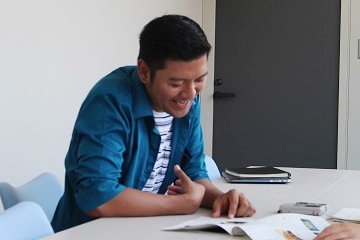
How about your cultural experience in Japan?
I attended so many festivals such as the Yukata Matsuri of Hiroshima University, the Flower Festival in Hiroshima City, but my first was the Sake Matsuri in Saijo. During the Sake Matsuri, I was surprised to see how quiet and ‘disciplined’ Japanese people are even when they are so drunk! (laughs) I also attended the Lemon Matsuri in Setoda too, it was conducted for the first time this year. So I’m proud to be part of the history!
And I have a very supportive host family. They let me experience a lot of Japanese culture like the tea ceremony, and the New Year celebration, Oshogatsu. They prepared the osechi ryori (New Year's food) for me. It was sooooo delicious! And then, they brought me to different places in Hiroshima to experience Japanese culture. They are such nice people!
It seems that you are fully enjoying life in Japan.
Yes. In the Philippines we don’t have winter, so when I experienced winter here, I was really amazed. I remembered the times when I was waiting for the snow to fall. When the snow began to fall, I called my friends, ‘Oh, it’s snowing, it’s snowing! Let’s go outside!’ It was ten o’clock in the evening and we went outside the dormitory just to enjoy the first snow.
During the summer vacation in the Philippines last April and May, my wife and two children were here in Japan. My wife, who is also a teacher, went back to the Philippines to file a leave of absence to spend more time together with me while I’m studying in Japan. I want them to experience the beautiful four seasons of Japan.
I hope your family will enjoy life in Japan. Dave-san, do you have any advice you would like to give to younger people in your country?
Yes. My advice to them is ‘Always be positive!’ And they should go out of their ‘comfort zone’ just like me. You are comfortable with your hometown, your language, but opportunity is waiting for you outside your comfort zone. I call that the ‘courage zone’. Explore and be challenged, because if you are not, life will be boring.
Thank you very much. Dave-san, please tell me your dream.
Well, in my career, I want to be an influential educator. I’d like to influence many teachers and educators with the positive things and the new trends in education like the teaching strategies I’ve learnt in Japan. Probably I will also write textbooks for the Filipino high school students.
And for my family, I want my children to study in Japan because the Japanese children are so disciplined. They walk from their home to school. The parents are not allowed inside the campus, and the kind of learning that they have - I like it! So, probably when they go to college or university, I want them to study in Hiroshima University.
Lastly, do you have any words or thoughts to add?
I would like to thank you for the opportunity you gave me for this interview. Thanks to you, I can share my thoughts not only to the Filipino people but also people around the world. And I appreciate all the things the Japanese people have done for me, especially my very supportive supervisor, Associate Professor Matsuura. He is so supportive of me in my research. Everything that I need, he provides, especially academic comments, academic support. That’s why my research is going smoothly.
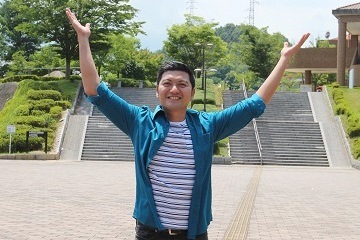
That’s wonderful. Thank you very much.
Thank you so much. I hope you enjoyed my story.
Photo Gallery
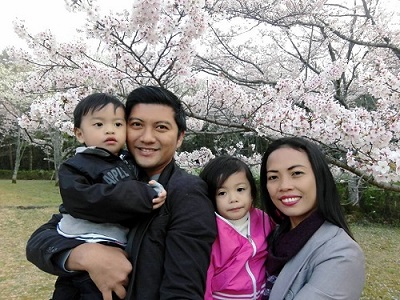
Family Life in Japan (1) : I love spending time with my family in different beautiful spots in Hiroshima Prefecture
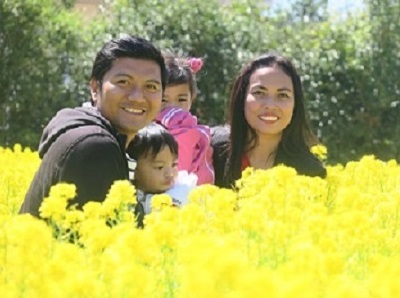
Family Life in Japan (2)
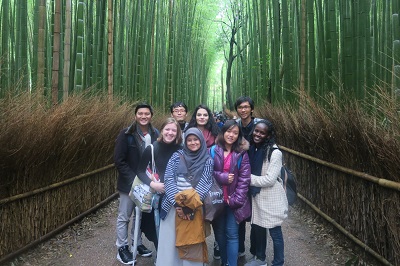
With my Friends in Arashiyama Bamboo Grove, Kyoto
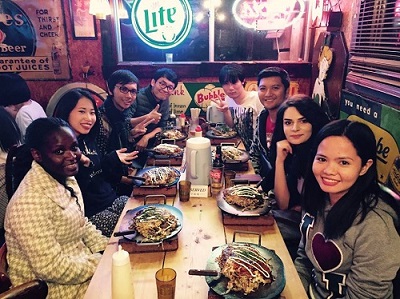
Enjoying Hiroshima Style Okonomiyaki with International Students and Student Supporters
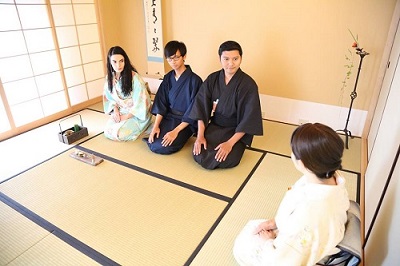
Experiencing Unique Japanese Culture
- The Tea Ceremony (1)
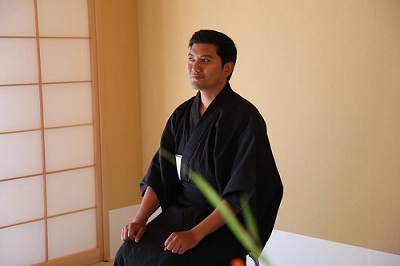
Experiencing Unique Japanese Culture
- The Tea Ceremony (2)


 Home
Home